Key takeaways:
- Community storytelling fosters empathy and belonging by connecting individuals through shared experiences and values.
- Personal narratives in pro-life advocacy humanize complex issues, inspiring solidarity and support while reshaping perceptions of difficult choices.
- Sharing stories creates a safe space for vulnerability, encouraging active listening and fostering deeper understanding within communities.
- Advocacy thrives on storytelling as it transforms statistics into relatable experiences, motivating individuals to take action and support important causes.
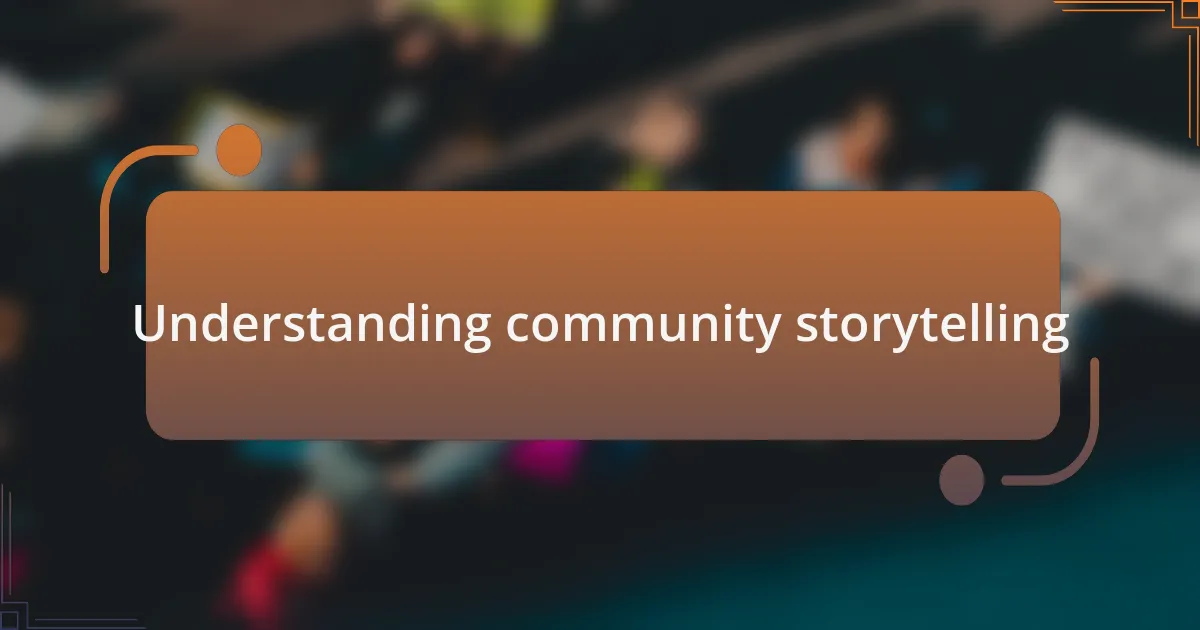
Understanding community storytelling
Community storytelling is a powerful way to connect individuals and foster a sense of belonging. I remember participating in a local event where individuals shared personal experiences related to family and values. Listening to those stories made me feel more connected to my neighbors and highlighted our shared struggles and triumphs.
In essence, storytelling within a community lays the groundwork for empathy and understanding. Have you ever experienced the warmth that comes from hearing a story that resonates with your own life? I have found that these narratives often reveal the core values that bind us together, regardless of our differences. They create a shared language that cultivates compassion and respect.
Additionally, community storytelling serves as a platform for marginalized voices that often go unheard. I once met a young woman who bravely shared her journey regarding unexpected pregnancy and the support she received from her community. Her courage not only inspired others but also sparked a crucial dialogue about our responsibilities towards one another. In this way, storytelling becomes not just an act of sharing but an essential part of nurturing a supportive community.
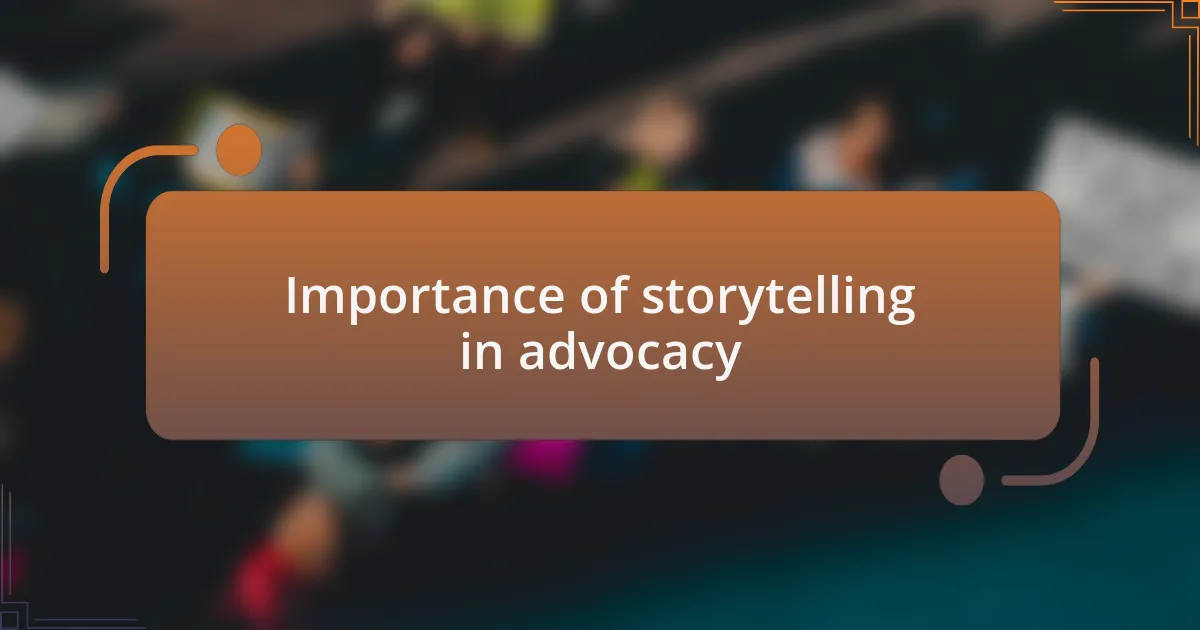
Importance of storytelling in advocacy
Advocacy thrives on storytelling because it transforms abstract concepts into relatable experiences. I vividly recall attending a pro-life conference where stories of women who chose life over hardship captivated the audience. Hearing these firsthand accounts didn’t just inform; they moved people to action, inspiring a deeper commitment to supporting mothers in need.
When we share stories, we personalize statistics. For example, instead of talking about the percentage of women facing unplanned pregnancies, we can highlight an individual story that illustrates the emotional turmoil they navigate. Have you ever felt the weight of a choice echoed through someone else’s experience? This connection can turn passive listeners into active advocates, compelling them to join the cause.
Moreover, storytelling fosters resilience. I remember discussing a mother who faced numerous challenges but chose to embrace her journey, impacting countless others along the way. Her tale was a beacon of hope, illuminating how shared experiences foster community support and advocacy. These narratives remind us that we are not alone; they inspire solidarity and collective action in the face of adversity.
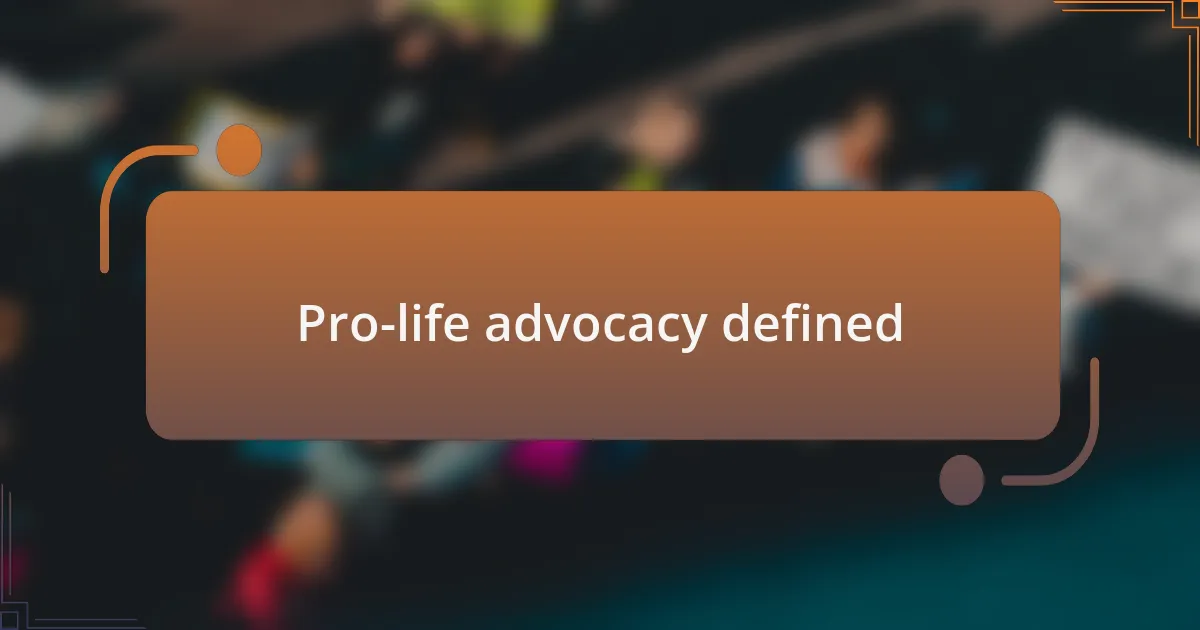
Pro-life advocacy defined
Pro-life advocacy circles around the belief that every human life has inherent value, from conception to natural death. This perspective is rooted in the idea that individuals deserve the chance to fulfill their potential, regardless of their circumstances. Personally, I find it incredibly powerful to witness how this belief motivates countless people to support mothers and their unborn children with resources and love.
In my experience, pro-life advocacy isn’t solely about opposing abortion; it encompasses a spectrum of support for both mothers and children. This can mean providing education, healthcare, and emotional support. I remember meeting a volunteer who dedicated her weekends to helping pregnant teens navigate their options. Her passion was infectious, and it struck me how her commitment embodied the essence of advocacy—not just a stance, but a deeply human response to need.
Moreover, the emotional depth of pro-life advocacy often gets overshadowed by polarizing debates. But when I engage in conversations with advocates, I notice undercurrents of hope and compassion. Don’t we all want to stand for something greater? It’s this shared aspiration that transforms advocacy into a vibrant community, one where stories connect us and inspire action, creating a network of support that resonates far beyond individual experiences.
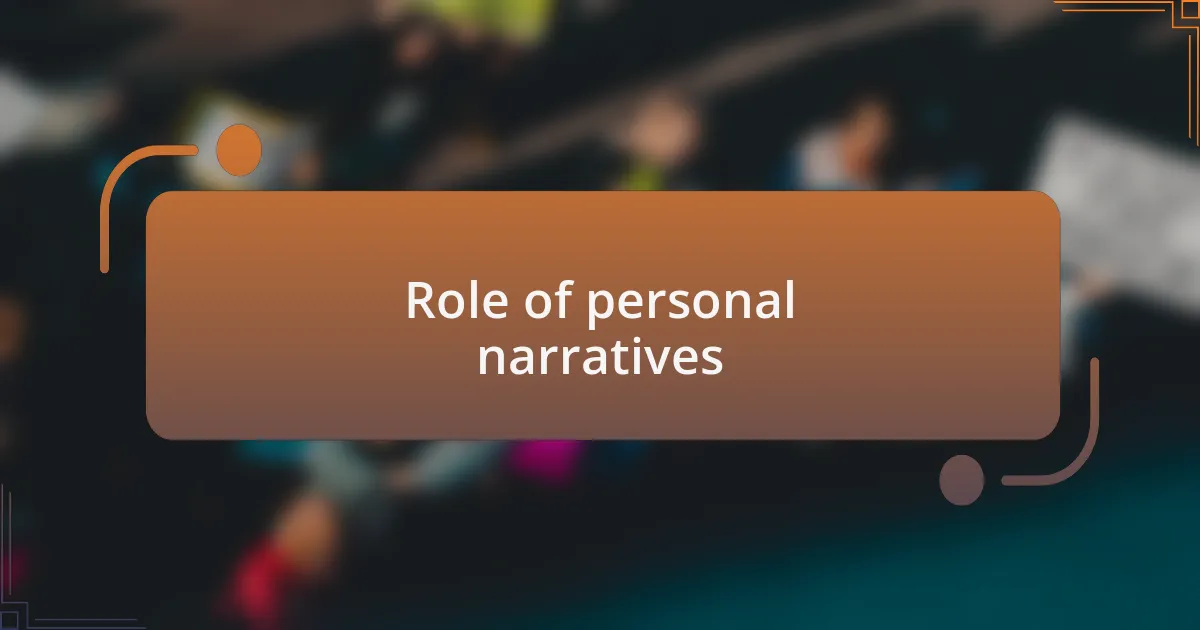
Role of personal narratives
Personal narratives play a crucial role in pro-life advocacy, as they offer a unique glimpse into the diverse experiences of individuals facing pregnancy and parenthood. I recall a heartfelt story shared by a mother who chose to keep her child despite significant challenges. Her words brought tears to my eyes, illustrating the complexities of choice and resilience. Isn’t it powerful how a single story can spark empathy and understanding among those who might not initially agree on the issues?
Through personal narratives, we can humanize what can often feel like abstract concepts in the pro-life debate. For instance, the tale of a young woman who struggled with her decision to continue her pregnancy resonated deeply with many in our community. Her candid account of fear and ultimately joy after embracing motherhood struck a chord with listeners, demonstrating that real-life stories can cut through political rhetoric and forge meaningful connections. How can we ignore the emotional weight of such sharing?
Furthermore, these stories amplify voices that are often sidelined in larger discussions. I remember attending a gathering where an advocate shared her journey of adoption, revealing how it transformed her life and the life of the child she chose to raise. It was a poignant reminder that every narrative carries a lesson. By embracing and sharing these personal accounts, we not only validate individuals’ experiences but also inspire others to reflect on the profound impact of their choices.
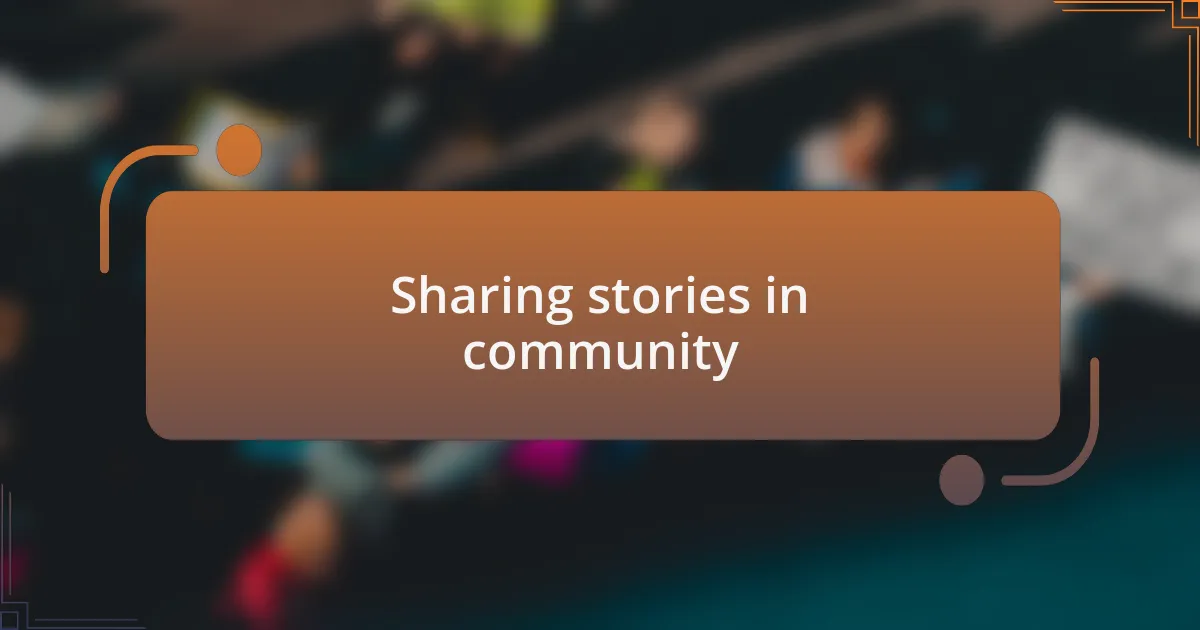
Sharing stories in community
Sharing stories in community creates a tapestry of experiences that can unite us. I remember a local event where individuals shared their journeys surrounding unexpected pregnancies. Each story brought forth different perspectives, revealing common threads of hope and determination amidst uncertainty. Isn’t it remarkable how such gatherings cultivate a sense of belonging and understanding among diverse participants?
Stories shared within a community can serve as vital tools for advocacy. For instance, I once listened to a father recount his struggles after the birth of his child with special needs. His vulnerability and honesty sparked conversations that shifted the focus from fear to acceptance. That moment made me realize how powerful it is to allow ourselves to be seen and heard; it encourages others to voice their own experiences and feelings.
Moreover, the act of sharing isn’t just a one-way street; it fosters an atmosphere of listening and learning. I participated in a group where individuals exchanged stories about choices made during difficult times. The respect shown as each person spoke was tangible, creating a safe space for deeper discussions. How often do we take a moment to truly listen to the stories around us? By doing so, we empower one another and build a community grounded in empathy and support.
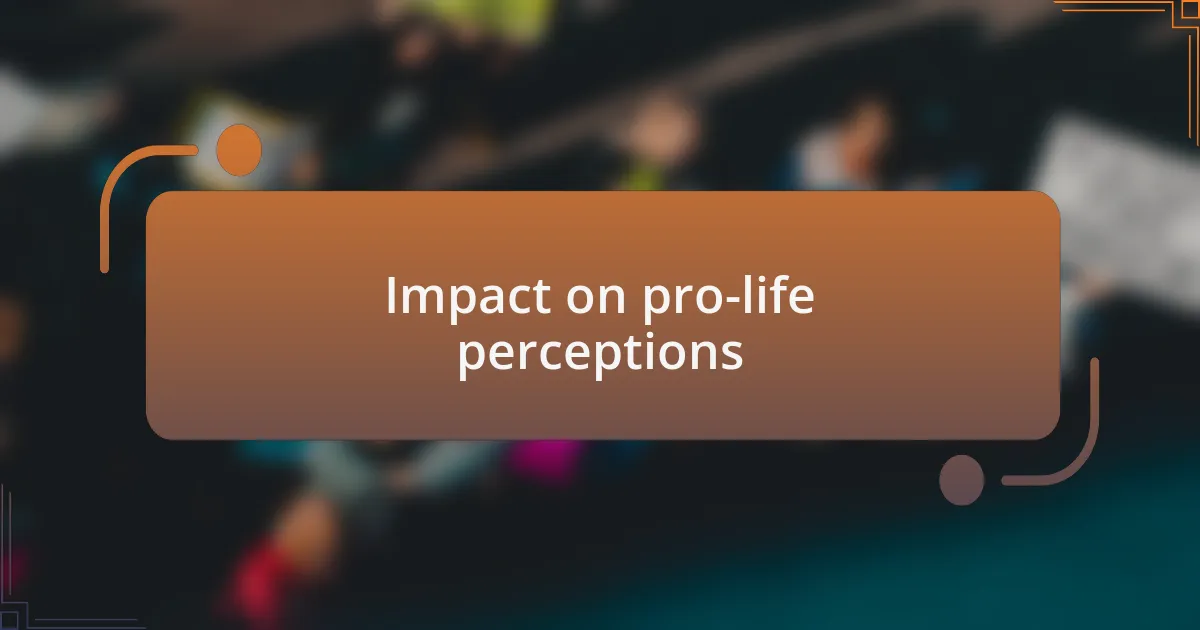
Impact on pro-life perceptions
When community stories about pro-life experiences are shared, they often reshape perceptions significantly. I recall attending a gathering where a woman spoke about her decision to keep her baby despite overwhelming odds. Her narrative transformed the room; you could feel the shift in our understanding of resilience. How can a single story create such a ripple effect in empathy and support among listeners?
In my experience, hearing these personal tales cultivates a greater appreciation for the choices people make. A friend of mine shared his journey as an adoptive parent. His heartfelt recounting not only highlighted the beauty of adoption but also illuminated the challenges faced by birth mothers. This perspective opened discussions that I hadn’t encountered before, encouraging others to rethink what pro-life advocacy entails.
The emotional weight behind these shared stories plays a crucial role in altering perceptions. During a panel discussion, a young woman detailed the internal conflict she faced before choosing life for her baby. Listening to her voice tremble with raw honesty led many in the audience to reflect on their beliefs and assumptions. Isn’t it fascinating how personal narratives can challenge preconceived notions in such a powerful way?
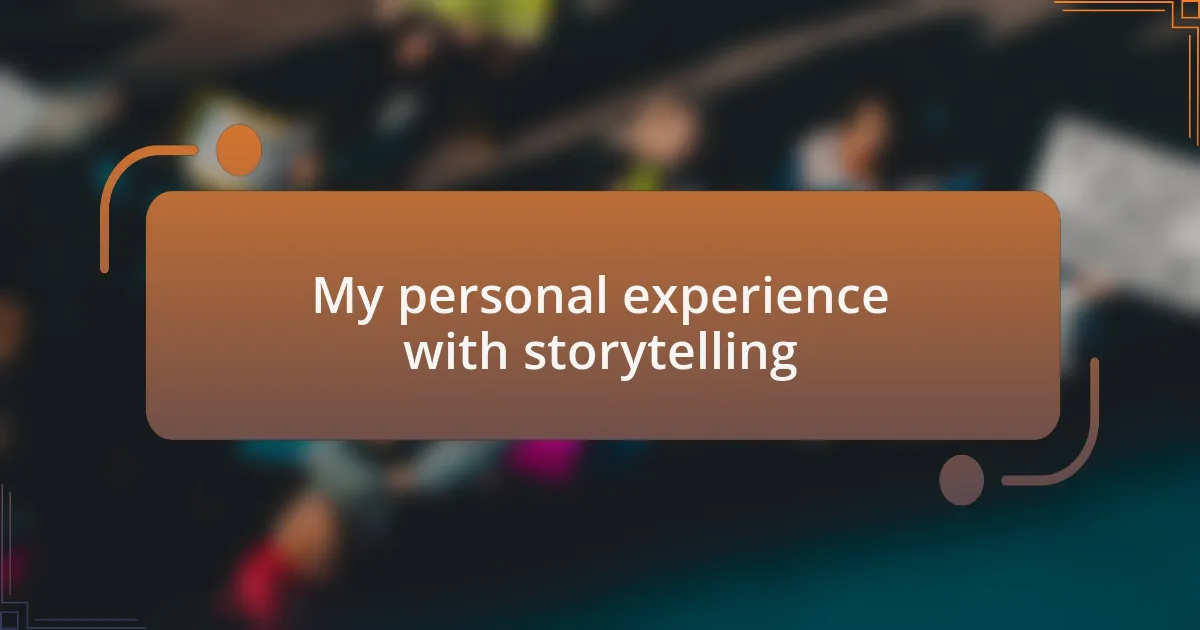
My personal experience with storytelling
Storytelling has always been a profound part of my life, often guiding my understanding of complex issues like pro-life advocacy. I vividly remember the first time I shared my own story at a local event. Standing before a group of strangers, I felt a wave of vulnerability but also connection, as I revealed my journey through unexpected struggles and the joy of my child’s arrival. That moment taught me that sharing our experiences is not just about personal relief; it’s about weaving a tapestry of shared understanding.
One particular experience remains etched in my mind. I participated in a workshop where we were encouraged to write about our stories. I crafted a piece highlighting my friend’s struggle with infertility and her eventual decision to adopt. Reading it aloud brought tears to my eyes, and I could see the audience hanging onto every word, some even nodding in recognition of their own similar experiences. Isn’t it remarkable how storytelling can transcend our individual pains and unite us in mutual understanding and compassion?
Often, I find myself reflecting on the stories I’ve collected over the years, how they’ve shaped my beliefs and actions. For instance, after hearing a poignant account of a woman who faced societal pressure to choose differently, I realized the importance of listening without judgment. Her story underscored for me that every choice is deeply personal and often fraught with complexities that the outside world may never fully understand. How can we foster a richer conversation around pro-life issues if we don’t first open our hearts to the myriad stories that exist?